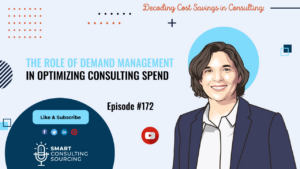Hello and welcome to episode 62 of our podcast: Smart Consulting Sourcing, THE podcast about Consulting Procurement.
My name is Hélène, and I’ll be your host today.
Each week I’ll give you the keys to better use, manage and source consulting services. This week, I’ll tell you how to evaluate the quality of a consultant
Last week, I explained how to qualify a consulting firm for a project
We saw that Having a list of consulting firms perfect on paper is not enough to qualify them for a project. You need to find out how real they are. You can’t just “go with your gut” here. A thorough reference check is the only way to make sure this consultancy is right for you.
It’s not easy to find a consulting firm that meets all of your criteria, but it’s well worth the effort! By following the right process, you’ll be able to find the best fit for you and your project.
But today let’s talk about performance.
Is it worth measuring the performance of Consulting Services? Many consulting firms will tell you that there’s no need to analyze performance any further as long as consumers continue to buy. Is this truly the case?
In most procurement categories, the purchased goods’ receipt and inspection are key steps in the process. When the product is damaged or not compliant with the requirements, it will be rejected. When the product is compliant but not satisfying, the provider’s contract will not be renewed. When a supplier is subject to numerous claims, it will be removed from the panel. It is the ultimate penalty in the Automotive Industry, for instance.
Surprisingly, despite the significant amounts at stake, 57 % of companies don’t have a systematic Performance Evaluation system for the Consulting Category. And as the cobbler’s son often has the worst shoes, even consulting firms don’t necessarily have a robust system for measuring customer satisfaction. They realize the client was unhappy when the account is lost. Quite an accurate measure of satisfaction, but maybe we can do better.
You know the saying: If you can’t measure it, you can’t improve it.
Consulting Firms are craving for feedback to engage in a continuous improvement process and monitor their relationship with their clients. And their clients are expecting them to listen to them and improve their ways of working. So why are these conversations not taking place?
Executives often see Consulting Services as a black box. Intangible Services, like consulting, are challenging to handle, and measurement can be tricky. It seems impossible to translate impact or trust into metrics. But companies know from experience that even intangible objectives can be measured. Since Peter Drucker has popularized management by objectives in the 50s, it became a standard in General Management. SMART objectives[1] are used across the board to help employees have a clear understanding of their roles and responsibilities.
The same can apply to Consulting Services. When you hire a Consulting Firm, you have some expectations such as the quality of the deliverables, the ability to understand your business, build trust with the stakeholders, etc.
Why not measure the achievement of these objectives?
Without data, you are just another person with an opinion.
Let me tell you another saying that I like a lot: Without data, you are just another person with an opinion.
Consultants are kings for building elaborate dashboards, KPIs, and management systems to track improvement performance. But, strangely, they rarely taste their own medicine. As a result, management consulting remains an informal business when measuring and proving its own impact.
Implementing a systematic Performance Evaluation specific to Consulting Services is a cornerstone of the Consulting Category management. The benefits can be seen at different time horizons.
In the short term, you can use it to trigger a post-mortem analysis. In other words, when a project is over you’ll be able to find quickly what went well and what did not go well in order to find out which lessons can be learned from it.
The beginning of the implementation can be rocky. However, being attentive to feedback from the main departments or business lines using consulting can help procurement identify the Consulting Firm with performance issues and gather the necessary information to build the right improvement plan.
Mid Term: At this stage the entire organization will have a better understanding of how this service contributes to success or failure. A systematic approach means that each team member is involved in the process and has a shared understanding of the purpose of their contributions.
Longitudinal tracking of your providers’ performance is the only objective way to monitor the providers, benchmark their performance, and identify high and low performers: three essential elements to keep a fluid Preferred Supplier List. This analysis will also help you to identify capabilities with insufficient performance. In fact, you can be very well equipped in Marketing and struggling on the innovation front.
Long Term: This information is valuable throughout the year on several levels: you have now an opportunity to benchmark with previous projects and you can measure KPIs across teams within your own business unit.
The purpose of aligning your Consulting Spend with your Strategy is to maximize the Value for Money you invest in consulting. Year-Long performance evaluation of your Consulting Projects’ impact will help you validate your decisions and make sure the money has been well spent with the expected impact.
Don’t forget that you can evaluate the performance at all stages of a Consulting Assignment. Mid-project assessments are a healthy practice on very large projects. Otherwise, post-mortem analysis might well be aptly named.
What criteria to assess the quality of a consultant?
What do you need to measure? You have built or used a Performance Evaluation System before. It is not rocket science. Keep in mind a few common-sense tips:
Identify what is important for you. The goal of an Evaluation system is to make sure that the Consulting Firms are delivering according to your expectations. But what are your expectations? What are the key success factors for a Consulting Project? Is it the quality of the delivery? The expertise of the team? The impact delivered?
Consistency is key. You can decide to have a specific assessment for each project based on the key deliverables. However, if you want to leverage benchmarking, you have to find the right granularity to build a standardized evaluation. Also, you need to use it on a systematic basis to create statistical relevance. You may also want to use third parties in performance measurement.
Think human. Don’t forget that the driver for a Consulting Project’s success is very often the Partner or the Project Manager in charge. His knowledge, expertise, and behavior are what you are assessing for your project. You can decide to assess the performance of each consultant in the team – pretty time consuming, with little impact for you – up to the performance of a company as a whole on the project – which can make sense for a small consulting firm but is more questionable for a big 4.
When you are building your questionnaire, don’t forget to include a Consulting Project’s soft aspects. The ability to build trust, create buy-in or transfer knowledge, for instance, are things that you might want to look at depending on the project’s purpose.
Do not hesitate to ask for feedback on how the project unfolded and what your company could have done better. Some companies will be very sharp in expressing their needs but fail in achieving internal alignment. Some others might struggle to formulate what they want or define unrealistic requirements (time or budget-wise). Capturing this feedback will help you to increase progressively your capacity to use and manage consultants.
In conclusion
Evaluating the performance of your consulting projects will give the keys to improving the value of your investment, and the satisfaction of your internal clients. Others will claim that consulting is intangible, making it impossible to quantify, but this is merely a pretext to prevent change. Other domains have succeeded in defining solid evaluation systems for intangible results.
And this concludes our episode. Next time, I will try to answer the question: do you always need global consultants for global projects?
In the meantime, if you have any questions, or want to learn more about what we do at consulting quest, just send me an email at helene.laffitte@consultingquest.com
You can also have a look at our website smartconsultingsourcing.com to know more about our book and download free templates & guides to improve your consulting sourcing.
Bye and see you next week! Au revoir!







